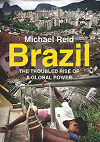This book was released in June 2014 in the run-up to the Football World Cup which raised Brazil’s global profile. The ignominious defeat of the Brazilian team is two sides of the same coin, and emblematic of the ‘troubled rise’ of the country which has flattered to deceive. Which is why Michael Reid’s assessment is particularly interesting at this moment.
Brazil’s star rose and shone brilliantly under the ambitious and visionary Lula government from 2003 to 2011. His successor Dilma Rousseff’s low prioritisation of foreign policy has lost the gains made in the decade past.
Reid starts his book with a speech by Lula in London in 2009, a speech that captivates the audience with the achievements and vision of his government. When Lula finished his second term in 2010, Brazil looked unstoppable, with a 7.5% growth despite the global financial crisis and the continuing European crisis. After winning the rights to host the World Cup and Olympics, Lula claimed that Brazil had achieved its rightful pace and was at last considered a ‘first class country’.
Reid rightly says that Brazil has many of the ingredients for becoming a global power—a large land mass, a young population, abundant natural resources, energy and food security, a large and diversified manufacturing base, scientific and technological innovation and global leadership in niche manufacturing sectors.
According to Reid, The last was achieved by Brazil’s industrial policy of ‘guided capitalism’ in which the state-owned Brazilian Development Bank (BNDES) gives huge credits and takes stakes in Brazilian companies such as the world’s largest meat processing company—JBS, promoting them to become global leaders. “Brazil,” Reid says, “…built as a nation by top-down elites, is now moving to its next chapter of bottom-up political and economic reforms by a growing middle class”.
However, Brazil’s rise is encumbered by its internal weaknesses—after three terms in office, the Workers Party(PT) looks tired and bereft of new ideas. Brazil spends far more on its old people than on its children. The industrial sector of Brazil is rendered uncompetitive by the complicated, burdensome tax system and a high cost of production, all of which together are called ‘Custo Brasil (Brazil cost)’. But the most fundamental factor is the Brazilian mindset. Reid quoteS Eduardo Giannetti, a Brazilian liberal as saying, “If Brazil did not become like the United States it was because it did not want to. The Brazilians were not prepared to sacrifice alegria (happiness) and an easy-going approach to life, for capital accumulation and future prosperity.”
Reid’s commentary is on many occasions influenced by his obvious western mindset. He blames Brazil’s low global profile for not showing leadership during times of crisis—especially, the Brazilian refusal of support to the U.S-led unilateral interventions in Iraq, Libya and Syria. But Lula taking the initiative in the iran nuclear deal, is termed by Reid as adventurism. The author also underplays Brazil’s leadership in Latin American regional and sub-regional integration as well as in initiating groupings such as IBSA (India-Brazil-South Africa).
Reid is mostly right on the mark when he says that in Brazil’s world-VIEW, there is a deep-rooted suspicion of Washington and that the U.S. is set on blocking Brazil’s advance. He quotes Peter Hakim of the Inter American Dialogue concluding that “Brazil and the U.S. will remain friends but they are not likely to emerge as partners or allies”.
Reid, who has lived in Brazil as correspondent for The Economist, provides an integrated and analytical overview of Brazilian history, politics, economy and society in a fairly objective manner. As an experienced Latin America columnist, he has made an effort to look at Brazil with a regional perspective, and understands his subject when he concludes that “Brazil is a world of its own and they like the Americans, have a strong sense of Brazilian exceptionalism”.
Brazil – The Troubled Rise of a Global Power, Michael Reid, Yale University Press, June 2014
Ambassador Viswanathan is Distinguished Fellow, Latin America Studies, Gateway House. He is the former Indian Ambassador to Argentina, Uruguay, Paraguay and Venezuela, and Consul General in Sao Paulo.
This review was exclusively written for Gateway House: Indian Council on Global Relations. You can read more exclusive content here.
For interview requests with the author, or for permission to republish, please contact outreach@gatewayhouse.in.
© Copyright 2015 Gateway House: Indian Council on Global Relations. All rights reserved. Any unauthorized copying or reproduction is strictly prohibited.


